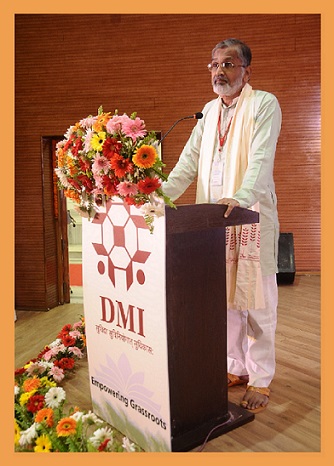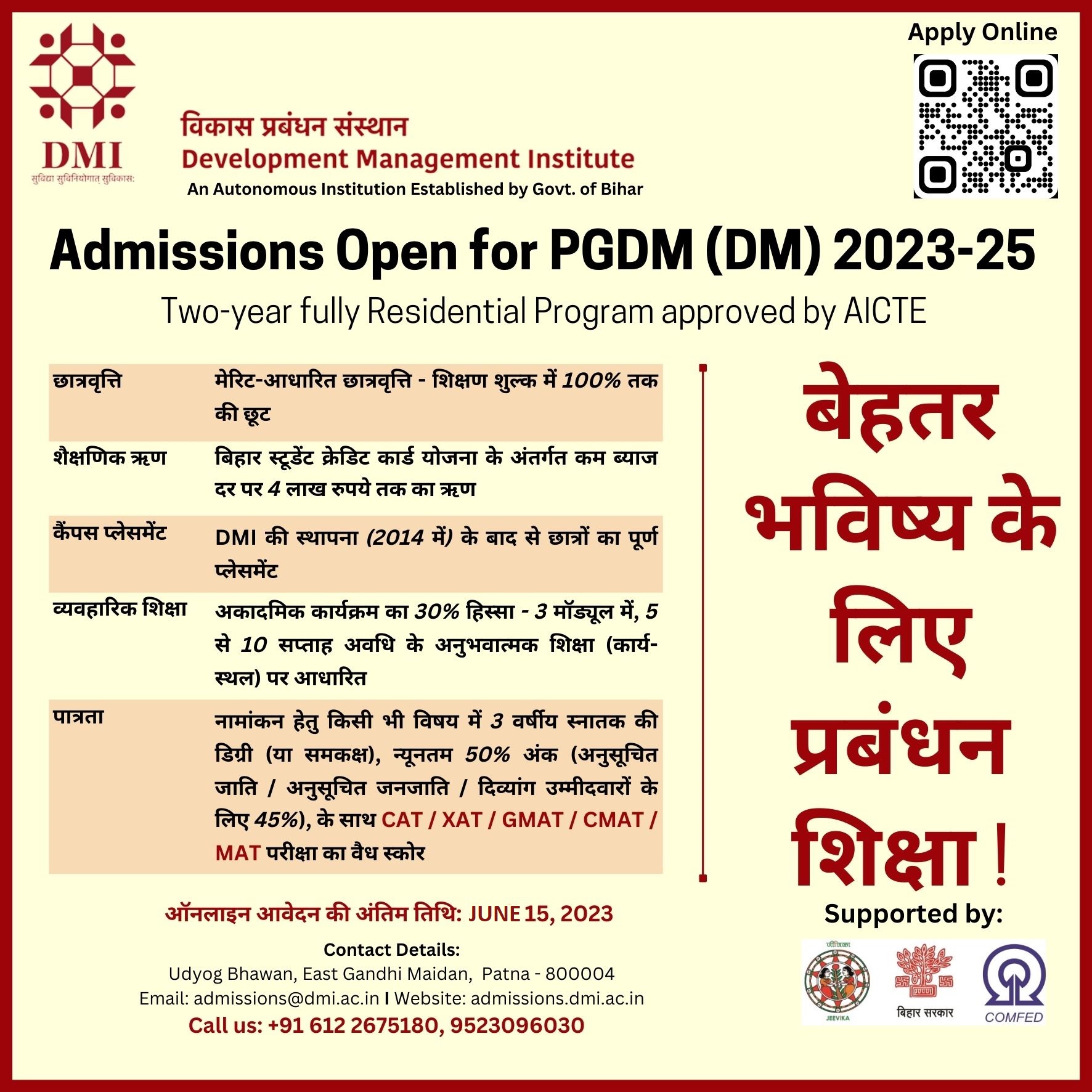
Mr Anup Mukerji, an individual of exceptional simplicity and greatness, Mr. Chaudhary, Prof. Hemnath Rao, Prof. Niraj Kumar - the members of the DMI Governing Body - Renana Ji, Dr. Rekha Kumari, Hon'ble Guests, the faculty members, parents and the graduands who are receiving their degrees today. I am honoured to be invited to this young institution. Though, the outcomes of an educational institution cannot be assessed in less than twenty years because it is only after twenty years that their alumni start making impact on life, yet at the very inception, I can see very different culture in this organisation.
Peter Drucker once said that the culture eats strategy for breakfast. Strategies are child's play, it is the culture of the organisation that sets the values, inspiration, motivation and life paths. I can see Gandhi in the culture of this organisation. As far as I know, you might be the only organization, an educational Institution, which boasts of Gandhi's “Motihari Statement” of 1917, through which Gandhi arrived on the political scene of India. To celebrate dissent, to celebrate voice of conscience; not many institutions do this. When we were walking towards this hall, the song that we were hearing –“एकला चलो रे”; the dress that you wear; and the cotton Anga-vastram which is placed on you today - it places responsibility on you. It is very symbolic; it is cotton made. It gave livelihood to the farmers of Vidarbha who are committing suicides. It gives livelihood to several women, spinners and weavers. So, every symbol is of significance. The culture of the organisation speaks a lot about this organisation to me. I am glad that I have been called here to give this convocation address. Thank you for this honour, Sir.
Young friends, who earn their PG Diploma today. First, I want to congratulate you. Congratulate, because you are blessed with three gifts - first is the gift of the training that you received; and more than training, the learning that you generated out of that training, Management is an art and science of converting minimum resources into maximum outcome. We are a resource poor country; poor in some senses but rich in several other resources. You have learned the science of management, you have become master of it. Now go and practise it masterfully; more important, practise it meaningfully. The second gift that you are blessed with is that you have huge problems to solve. Challenges are waiting for you, challenges of global magnitude, such as global climate change and economic inequality. Thomas Piketty has shown us that over the century, inequality is increasing. Oxfam reports quantify for us, the extent of economic disparity in India. NSSO data also tell us that unemployment is increasing. You have huge problems to solve; they are waiting for you. The third gift you have, which my generation did not have, is that you have new technologies and new resources. Resources of infinite possibility and infinite order- the technology, the digital world, the knowledge economy, globalization – everything is available to you. You are blessed to enter into this new world with the newly acquired knowledge and skills. But more important than the knowledge in the head, is passion and compassion in your heart.
Today, when you receive this diploma certificate, when you will open it, on one side you will find your name and diploma written on it. You have earned it in a hard way, congratulations! But turn that certificate and you will find that the other side of the certificate is blank. It is your privilege, your prerogative to write your future on that blank side of the certificate. You have a blank cheque in your hands. You will write your future on that blank cheque. My best wishes as you enter the world full of possibilities with a blank cheque in your hand.
Now the real question is, with all those gifts and possibilities, what are you going to make of your life? You have this life only once. There is no once more to this life. The one thing that I'll urge you is not to sell this precious life for money. If you open today's ‘Times of India’ on the front page there is a comparison as to what pay scale and annual compensation package that the graduates of the most prestigious institutions in India receive; and based on that various institutions have been ranked. I find that worse than pornography. The best brains in the country are coming to the best institutions of India and the outcomes of these institutions are evaluated in terms of pay packages? What a pathetic mindset!
Money is infinite in this world, literally infinite - you can't count it. The global GDP is something like 80 trillion dollars, you can't count even the zeroes of that sum. Money is infinite –but your life is only one. When there is an exchange between something which is infinite, unlimited and something which is only one - the ‘one’ becomes invaluable. So, never sell your only one life for the sake of money. It will be a stupid bargain. Money is necessary as a means to live but it doesn't provide you the meaning of life. The meaning you have to find yourself. Viktor Frankel, in his very well-known book, ‘Man's Search for Meaning’, says it beautifully, “Those who know the ‘why’ of living have no problems about the ‘how’ of living”. We are all stuck in the dreams of the ‘how of living’ - two bedroom flat or three bedroom flat; this car or that car; compensation packages; and bank balances. These are all the ‘how’s’ of living. But more important and fundamental is the “Why of Living”. Why am I living? What is the purpose of life? If you do not have a purpose of my life, all the zeros of bank balance literally become ‘zero’. Hence, it is your prerogative, it is your privilege and it is your responsibility to find the purpose of your life.
Where will you find this purpose of life?
Nearly 70 years ago, my father, who was a brilliant young economist, had earned all the gold medals possible in the University. He was a freedom fighter. When he was released after the 1942 movement, the then government thought of sending him to the US for studying economics, further. He got his admission, visa, scholarship papers, his travel documents. A week before his scheduled departure, he went to see Mahatma Gandhi. Gandhiji was sitting in Sevagram Ashram in that hut. My father went in and bowed to him. Gandhiji looked up, and since he knew him, he asked him, “How are you Professor Bang? ”My father said, ‘Bapu, I am going to the US for learning economics further’. Gandhiji looked at him for few seconds and then uttered only one sentence. He said in Hindi, so I'll state in Hindi–“अर्थशास्त्र सीखना है तो अमेरिका के बजाय भारत के देहातों में जाओ”. (If you wish to learn economics, go to the villages of India.)
That was all. My father quietly came out and, right outside the Bapu Kutir, he tore up his travel documents and fellowship papers. Within a month, he formed a commune of his own students of economics and started living in a village like a farmer, to learn the economics of villages by living like a farmer.
Seventy years later, when I look back at this episode, what I learn is this, and I want to share it with you. My young friends, ‘Go where the problems are and not where the facilities are’. Places with facilities don't need you, there are long queues there and you become a problem there. Instead, go to places with problems. There are no facilities there but there are no queues either. Instead of standing in the long queue at places with facilities and air conditioners; where you are at the end of the queue with your application - ‘एक सीट मुझे भी दे दो. लेकिन आपके लिए वहाँ सीट नहीं है, आपकी कोई जरूरत नहीं है वहाँ पे’. What to do? Vinobaji has given a strategic master stroke in our hands. He says, again in Hindi, ‘दुनिया की ओर पीठ मोड़ो, पूरी दुनिया तुम्हारी पीठ के पीछे खड़ी होगी’. Turn your back, turn by 180 degrees, change your direction the whole world will be standing behind you, and you become the first. My young friends, instead of standing in established queues for jobs, start a new queue and you will be the pioneer.
Thirty-three years ago, when my wife Rani and I returned from the US and chose to go to Gadchiroli, the main reason was again Gandhiji’s words. They were still echoing in our ears, ‘Go to the villages of India’. I have studied in several Universities in India and abroad but I must say, my greatest learning occurred in the University of Gadchiroli. Problems were infinite in number. Problems were waiting for us and we were the only persons to fight. Tribal people with poor health, rural population with huge child mortality. When, for the first time, we measured it in that population, the infant mortality rate was 121. What do you do? No doctors were willing to go to Gadchiroli. After facing the problem of child mortality; children dying of pneumonia and of neonatal causes, we developed this new solution. If there are no doctors and if the sick babies cannot reach hospital, then hospitals must reach out to where the babies are! That's how the idea of Community Health Worker trained to become barefoot neonatologist and barefoot pediatrician emerged. As the Chairman of DMI just mentioned, under the current ASHA programme 9 lakh ASHAs in India have been trained and the ASHA programme is partly designed on that Gadchiroli model. Health Ministry sources tell me that last year, 11 million rural neonates received that home-based neonatal care.
When you are face to face with problems, out of the necessity, solutions come to you. When child mortality was reduced, women started saying, ‘Doctor, keep your medicines aside. Our main problem is our husbands drink.’ Initially, we tried to shrug this problem off because this was not our cup of tea. ‘Alcohol – what do we do? We are medical doctors and public health experts’. But women were insistent, ‘No you can do something’. Out of that persistent demand from women, a movement against alcohol started in Gadchiroli in 1988. We were forced to lead it for six years and finally in 1993, the Government of Maharashtra introduced prohibition in Gadchiroli. One of my reasons for coming to Bihar is that I want to learn from the experiment of Prohibition in Bihar. How has it been implemented? We have seen in Gadchiroli that after prohibition the problem was only partly solved. A new monster arrived - the tobacco. In 2015-16, we did sample surveys of Gadchiroli district, one of the most backward districts of Maharashtra. We found that people of Gadchiroli were spending from their pocket Rs.372 Crore annually on tobacco and alcohol. The annual plan of Gadchirolli District - developmental plan for that year – was Rs.157 Crore and people were spending on tobacco and alcohol, Rs.372 Crore.
Tobacco and Alcohol, is not only a health issue, but it is also a development problem. These substances generate poverty. We are now trying to evolve a new model called ‘Muktipath’ with the support of the Chief Minister of Maharashtra who chairs the Task Force of Muktipath, a four-pronged model of reducing demand as well as supply of alcohol and tobacco. I am glad to tell you that 600 Villages in Gadchirolli have completely rid themselves of alcohol and 200 villages have stopped tobacco sale. With a two crore worth of investment, two Crore rupees per year is the annual budget of Muktipath, there is an annual saving of Rs.94 Crore by way of reduced expenditure on tobacco and alcohol.
There is no dearth of problems at the grassroots. The grassroots speak to you. Grassroots are like that apple tree under which Newton sat. He sat under the tree and lo, the apple fell and gravity was discovered. Such apples are falling every day in the villages of India; in the slums of Patna, in the tribal areas of India, in women’s lives, in tribals’ lives, farmers’ lives. Such apples are falling every day. The only problem is that we are not there where the apples are falling. Today, I urge you to go where the problems are and you will become the ‘Newton’.
My young friends, your Director told us that all of you, all 22 of you have already got placement in your hands. I was sorry to hear that. If established organisations are already capturing you, where will you get the opportunity to go and address the unsolved problems? Lucrative jobs might entice you, they may offer you safety, security, higher level of salaries; but what about the purpose of your life ? What will happen to those unsolved problems ? I wish you go through a period of struggle with the problems – barefoot, with no resources. You and the problem, face to face ! There will be periods of frustration. You will feel the world is doomed. Nobody is going to support you. But from such situations the new solutions will emerge and new heroes will be born.
I am so glad to hear that you are working on “Nai Talim”. I am proud to tell you that I am a product of Nai Talim. My schooling happened in the “Nai Talim School” started by Mahatma Gandhi himself in Sevagram Ashram. The school was started by Mahatma Gandhi and Rabindranath Tagore. So whatever little I know today is from Nai Talim. The philosophy of Nai Talim is “Live Your Life and Learning Happens”. Face the challenges, do your duty, do your Swadharma, (duty) and the learning happens. That will make heroes out of you.
There is a railway station in South Africa you might have heard of it Pietermaritzburg– that is the station where young Mohandas Karamchand Gandhi was thrown out of the railway coach. For the whole night, he was shivering on that railway platform wondering, “What do I do? These are monstrous people, they don't respect me. Do I go back to India?”, he has written in his autobiography. And that night, the young Mohandas decided that he will fight. Exactly 100 years after that episode, in 1994, Gandhiji’s statue was unveiled in the Pietermaritzburg town. Nelson Mandela while unveiling the statue said, ‘Mohandas Karamchand Gandhi! When you came to us 100 years ago, we did not recognize you. We were ourselves in chains, so forgive us. But I want to tell India that hundred years ago you sent a bumbling young lawyer to us and twenty years later we sent back a “Mahatma”’.
How did Mohandas become “Mahatma”?
That change started at the Pietermaritzburg station. My young friends! While congratulating you, while wishing you the best, I want to meet you after twenty years in the year 2039 to see what have you made of your life.
Till then, "Shubhaste Panthana Santu"







